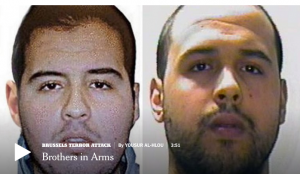 An article in The New York Times cites specialist researchers into terrorism some of whom I have been (again) discussing at length on this blog. I find that reassuring because it suggests the works I have been reading and writing about are indeed widely recognized as authoritative. In this case one of the researchers cited is Clark McCauley, a co-author of Friction — the series is being archived here. Another is J.M. Berger, author of ISIS: The State of Terror.
An article in The New York Times cites specialist researchers into terrorism some of whom I have been (again) discussing at length on this blog. I find that reassuring because it suggests the works I have been reading and writing about are indeed widely recognized as authoritative. In this case one of the researchers cited is Clark McCauley, a co-author of Friction — the series is being archived here. Another is J.M. Berger, author of ISIS: The State of Terror.
Referring to the two brothers responsible for the Belgium atrocity:
The Bakraouis join a list of brothers involved in nearly every major terror attack on Western soil since three sets of Saudi siblings were among the 19 hijackers who carried out the Sept. 11, 2001, attacks in the United States. Before then, the grim roster included 19th-century French anarchists, militants in Southeast Asia and the Jewish extremists who assassinated Prime Minister Yitzhak Rabin of Israel in 1995.
Anyone who has read Friction or my posts on the book knows that Russian anarchists also had their siblings and lovers acting together.
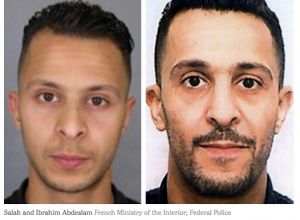 What advantage to brothers have?
What advantage to brothers have?
For terror groups, brothers can be ideal recruits. They radicalize each other while reinforcing a sense of purpose and ideological calling. They keep watch on each other to ensure an attack is carried out. One new study suggests that up to 30 percent of members of terrorist groups share family ties.
How do intelligence agencies eavesdrop on every communication among brothers?
How do intelligence agencies infiltrate when the “group” ensures only members they can trust because of close family ties?
Mia Bloom, co-author of “All in the Family: A Primer on Terrorist Siblings,” cited scholarly research showing that as many as a third of the people terror groups send to carry out attacks came from the same family. Examples abound of jihadists marrying a sister or daughter to another jihadist family in order to build alliances.
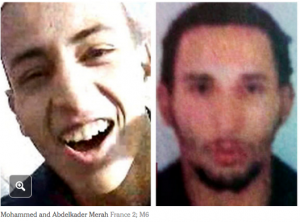 Siblings (or married couples) often work together, each one fearing to let the other down. On the other hand if one begins to buckle at the critical moment he can also potentially persuade the other to do likewise. A terrorist organisation will for that reason often send siblings out simultaneously on different missions. Mindful of each other they are motivated not to let the other down or lose face by failing their brother or sister.
Siblings (or married couples) often work together, each one fearing to let the other down. On the other hand if one begins to buckle at the critical moment he can also potentially persuade the other to do likewise. A terrorist organisation will for that reason often send siblings out simultaneously on different missions. Mindful of each other they are motivated not to let the other down or lose face by failing their brother or sister.
Psychologists who study terrorism say that the two-person cell may be a recent adaptation to increased security measures — whether they are brothers, as in Brussels, Paris and Boston, or husband and wife, as in the San Bernardino, Calif., attacks in December that killed 14.
As discussed in an earlier post, a sense of imminent threat can be the catalyst to violent action.
Psychologists who study terrorism say that the two-person cell may be a recent adaptation to increased security measures — whether they are brothers, as in Brussels, Paris and Boston, or husband and wife, as in the San Bernardino, Calif., attacks in December that killed 14.
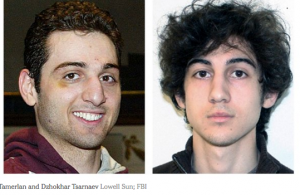 When authorities are closing in they must know that that is a time when threats to the public are peaked.
When authorities are closing in they must know that that is a time when threats to the public are peaked.
And yet again we hear the same old story of the perpetrators not seeming to others to have been all that interested in religion in their earlier days:
Ms. Mertens recalled the brothers as ordinary teenagers, not especially religious, who then disappeared from the neighborhood about five or six years ago. During this period, they were separately convicted of crimes including carjacking and engaging in a shootout with the police.
Ms. Bloom, the author who estimated that up to 30 percent of members of terror groups share family ties, warned that extremists were now trying to recruit entire families in Europe, portending the possibility of yet another evolution in jihadism. “Right now, we are seeing a lot of siblings carrying out these attacks,” she said. “The trend we are anticipating is parent and child.”
.
If you enjoyed this post, please consider donating to Vridar. Thanks!

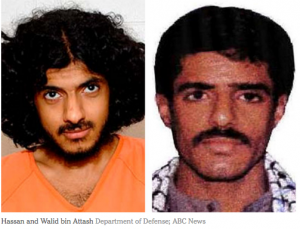
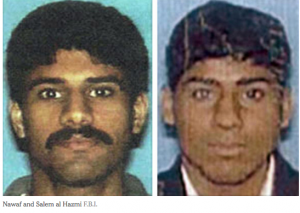
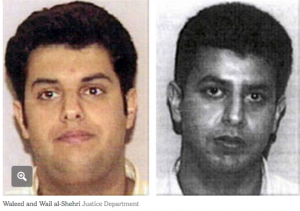
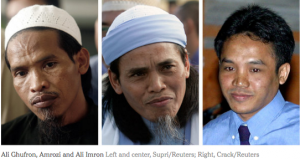
An article from the Washington Post confirming that latest round of ISIS terrorists are more street thugs than religious zealots;
https://www.washingtonpost.com/world/national-security/new-isis-recruits-have-deep-criminal-roots/2016/03/23/89b2e590-f12e-11e5-a61f-e9c95c06edca_story.html?tid=a_inl